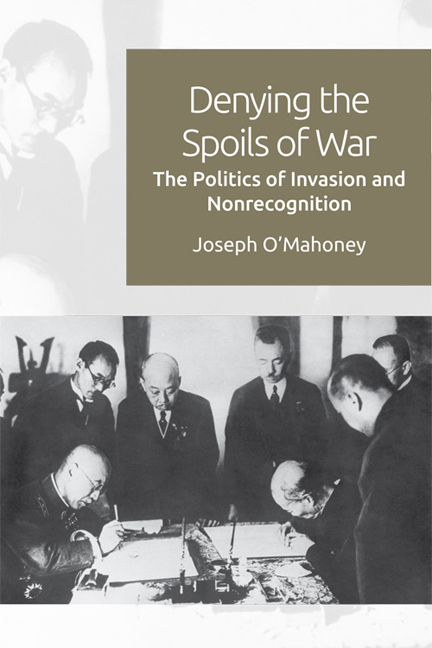Book contents
- Frontmatter
- Contents
- List of Figures and Tables
- Acknowledgements
- List of Acronyms and Abbreviations
- Introduction
- 1 Rule Maintenance: the Logic of Symbolic Sanctions
- 2 The Manchurian Crisis
- 3 The Abyssinian Crisis
- 4 Turkey, Cyprus and the Turkish Republic of Northern Cyprus
- 5 The Independence of Bangladesh
- 6 The Uncertain Fruits of Victory: Variation in Nonrecognition
- Conclusion
- Bibliography
- Index
6 - The Uncertain Fruits of Victory: Variation in Nonrecognition
- Frontmatter
- Contents
- List of Figures and Tables
- Acknowledgements
- List of Acronyms and Abbreviations
- Introduction
- 1 Rule Maintenance: the Logic of Symbolic Sanctions
- 2 The Manchurian Crisis
- 3 The Abyssinian Crisis
- 4 Turkey, Cyprus and the Turkish Republic of Northern Cyprus
- 5 The Independence of Bangladesh
- 6 The Uncertain Fruits of Victory: Variation in Nonrecognition
- Conclusion
- Bibliography
- Index
Summary
An important concern of models built on a few historical case studies, no matter how deep and robust the evidence in those cases, is whether they apply to other cases. In order to assess whether the model of rule maintenance can explain variation in nonrecognition, I now look at the broader range of cases where the cross-border use of force resulted in political change militarily asserted by the victorious state. Given the case selection criteria (see below) there are twenty-one relevant cases since World War I. While these cases cannot all be studied to the same depth as the few historical cases considered earlier in this book, they can give a preliminary sense of the direction of the evidence. In this chapter, the goal is to use the rule maintenance model to explain some of the variation we see in the broader universe of cases where nonrecognition was up for debate and also to use this broader universe of cases to improve the model by adding more content and identifying more specific mechanisms by which cases exit the ideal-typical process leading to a rule maintenance action like nonrecognition. I first define relevant concepts and specify case-selection criteria, before identifying some sources of variation in whether nonrecognition was adopted. Finally, I investigate the case of Russia's 2014 annexation of Crimea in more detail to see whether the model has relevance to the present day.
CONCEPTS AND CASES
A case is a candidate for a nonrecognition debate when three conditions obtain:
1 at least one state uses military force against another state, that is, across international borders;
2 there is some de facto ‘spoils of war’, that is, political change of some sort asserted by the militarily victorious state; and
3 the cross-border use of force is not collectively authorised by an international organisation.
The first condition excludes many cases of civil war or of secession. Some cases include elements of both interstate and intrastate violence. One example is the conflict surrounding the independence of Bangladesh, formerly East Pakistan, from Pakistan. Severe violence, perhaps rising to the level of genocide, was inflicted on the East Pakistanis by the West Pakistanis. However, India entered the conflict, going to war with Pakistan in both the West and the East.
- Type
- Chapter
- Information
- Denying the Spoils of WarThe Politics of Invasion and Nonrecognition, pp. 181 - 201Publisher: Edinburgh University PressPrint publication year: 2018



